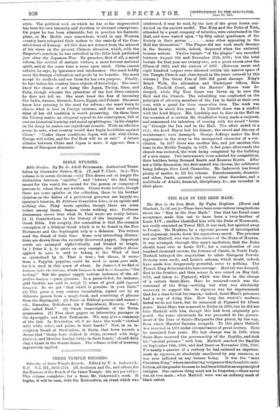THE MIN IN THE IRON MASK.
The Man in the Iron Mask. By Tighe Hopkins. (Hurst and Blackett. 7s. 6d. net.)—There have been some curious imaginations about the "Man in the Iron Mask." One that has found some acceptance made him out to have been a twin-brother of Louis XIV. ; another identified him with the Duke of Monmouth, not really executed on Tower Hill, it was said, but spirited away to France. Mr. Hopkins, by a rigorous process of investigation and argument, tracks down the mysterious secret. The prisoner was one Mattioli, who was in the service of the Duke of Mantua. It was arranged, through this man's mediation, that the Duke should hand over to Louis XIV., for a consideration of one hundred thousand crowns, the fortress of Casale, in North Italy. Manion betrayed the negotiation to other European Powers. Protests were made, and Louis's scheme, which would, indeed, have made him dangerously powerful, came to nothing. The French King determined to have revenge. Mattioli was decoyed, first to the frontier, and then across it, was seized on May 2nd, 1679, and taken to Pignerol, which was then in the charge of a certain Saint-Mars. Here he received—such was the command of the King—nothing but what was absolutely necessary to support life. So rigorous was his imprisonment that for a time he lost his reason,—indeed, Saint-Mars's prisoners had a way of doing this. How long the wretch's madness lasted we do not know, but he remained at Pignerol for fifteen years. Saint-Mars was removed to Exiles in 1681, but he did not take Mattioli with him, though this had been originally pro- posed. Six years afterwards he was promoted to the govern- ment of the Isles of Sainte-Marguerite (the prison, by the way, from which Marshal Bazaine escaped). To this place Mattioli was removed in 1691 under circumstances of great secrecy. Here ho remained four years. His last change was in 1693, when Saint-Mars received the governorship of the Bastille, and took his "ancient prisoner" with him. Mattioli reached the Bastille on September 18th, 1698, and died there on November 17th, 1703. Far nearly a quarter of a century he had endured an imprison- ment as rigorous, as absolutely unrelieved by any resource, as was ever inflicted on any human being. It was the "most Christian King" whose unrelenting vengeance thus found its satis- faction, all the greater because he had been foiled in an unprincipled intrigue. One curious thing must not be forgotten,—there never was an iron mask ; what Mattioli wore was an ordinary mask of black velvet.




















































 Previous page
Previous page